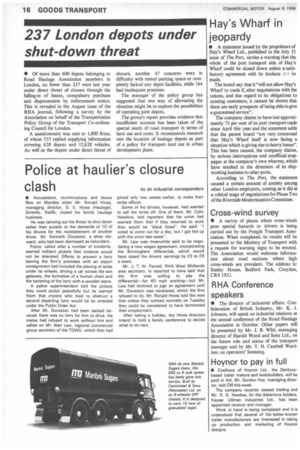Police at haulier's closure clash
Page 18

If you've noticed an error in this article please click here to report it so we can fix it.
by an industrial correspondent
• Accusations, recriminations and blows flew on Monday when Mr. Ronald Hines, managing director, D. E. Hines (Haulage), Streetly, Staffs, closed his family haulage business.
He was carrying out his threat to shut down rather than accede to the demands of 10 of his drivers for the reinstatement of another driver, Mr. Kenneth Doveston, a shop steward, who had been dismissed as redundant.
Police, called after a number of incidents, warned militant pickets that violence would not be tolerated. Efforts to prevent a lorry leaving the firm's premises with an export consignment had included the placing of tacks under its wheels, driving a car across the exit gateway, the formation of a human chain and the battering of the lorry with a wooden stave.
A police superintendent told the pickets they could picket peacefully but he warned them that znyone who tried to obstruct a second departing lorry would be be arrested under the Public Order Act.
After Mr. Doveston had been sacked because there was no lorry for him to drive, his mates had refused to work without him and called on Mr. Alan Law, regional commercial group secretary of the TGWU, which they had
joined only two weeks earlier, to make their strike official.
Some of the drivers, however, had wanted to call the strike off. One of them, Mr. Colin Hawkins, told reporters that his union had warned them that if they returned to work they would be "black listed". He said: "I voted to come out for a day, but I got fed up with the union last week".
Mr. Law was meanwhile said to be negotiating a new wages agreement, incorporating the Birmingham differential, which would have raised the drivers' earnings by £5 to £6 a week.
Mr. J. T. W. Parnell, RHA West Midlands area secretary, is reported to have said that the firm was willing to pay the differential---for 40 mph working—but Mr. Law had declined to sign an agreement until Mr. Doveston was reinstated, which the firm refused to do. Mr. Ronald Hines told the men that unless they worked normally on Tuesday they could be considered to have terminated their employment.
After taking a holiday, the Hines directors intend to hold a family conference to decide what to do next.




































































































